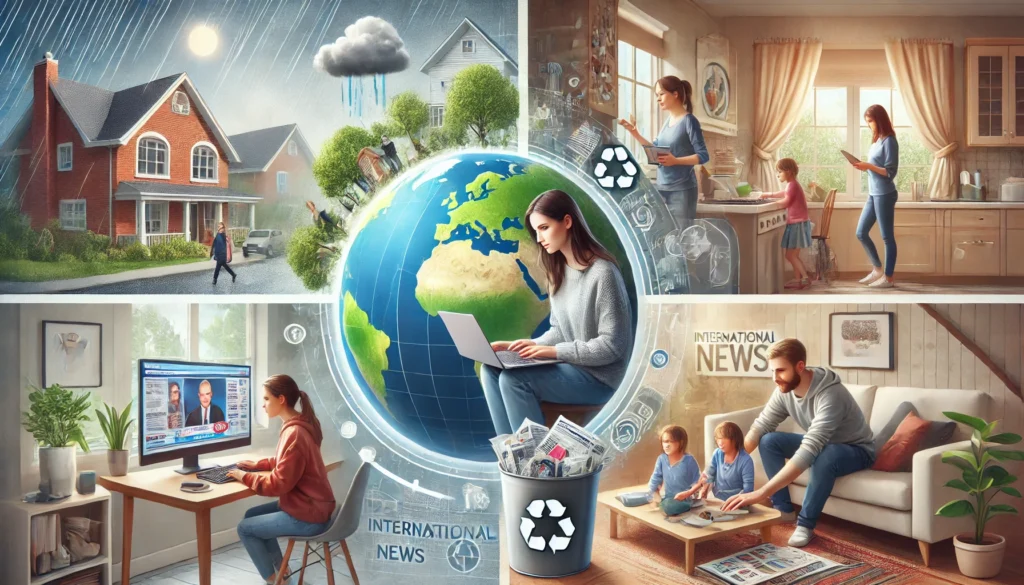How Global Events Are Reshaping Daily Life in 2025
In a rapidly connected world, the effects of global events are no longer limited to national borders. From pandemics and wars to climate change and economic disruptions, these large-scale phenomena significantly impact the daily routines, emotional states, and decision-making of individuals worldwide. In 2025, the world is witnessing major shifts that are influencing not only political and economic landscapes but also how people live, work, and interact on a daily basis.
The Influence of Global Crises on Work and Career Choices
The COVID-19 pandemic changed the way the world viewed remote work. But the long-term effects are even more profound. In 2025, hybrid work models have become the norm across industries, and flexibility is now a top requirement for many job seekers. Global health scares, war zones, and rising energy costs have pushed companies to rethink the way they operate.
As a result, many people are leaving traditional jobs for remote or freelance opportunities. The rise of the “digital nomad” has gone from a niche lifestyle to a mainstream career path. People are now designing their lives around freedom and adaptability, rather than stability alone.

Shifting Values Around Health and Wellness
Pandemics and environmental disasters have forced individuals to prioritize physical and mental well-being. People are no longer waiting for health issues to arise—they’re actively trying to prevent them. Daily routines now often include mindfulness practices, home workouts, and clean eating habits, spurred by both necessity and increased awareness.
Moreover, public health systems are being reevaluated worldwide. Access to healthcare, vaccine distribution, and mental health support have become pressing topics in national dialogues, and individuals are demanding better transparency and accessibility.
Impact on Social Behavior and Relationships
Global instability has triggered a renewed focus on personal relationships. In a world where uncertainty is constant, people are turning inward to strengthen ties with family and close friends. Digital communication tools continue to evolve, making it easier for long-distance relationships—both romantic and platonic—to thrive.
On the other hand, misinformation, political polarization, and digital fatigue have made many people more cautious about how and where they engage online. Trust is becoming a valuable currency—both in personal interactions and media consumption.
Education and Lifelong Learning in a Globalized World
Access to education is no longer confined to traditional institutions. Thanks to online platforms, people across the globe are learning new skills to adapt to changing job markets. In countries affected by economic downturns or political unrest, online learning has become a tool for empowerment and financial independence.
Global events have also inspired a surge in learning about current affairs, international policy, and climate science. Individuals are seeking to become more informed citizens, equipped to navigate and influence global discourse.
Climate Change and Eco-Conscious Living
Perhaps the most significant influence on daily life is the climate crisis. From extreme weather events to environmental regulations, climate change is reshaping the way people live. Individuals are increasingly investing in energy-efficient appliances, opting for plant-based diets, and reducing waste. Sustainability is no longer just a trend—it’s becoming a necessity.
Many governments are implementing green policies that affect how people commute, travel, and even shop. Carbon taxes, renewable energy incentives, and plastic bans are beginning to redefine consumer behavior on a wide scale.
Media Consumption and Digital Literacy
Misinformation has become one of the most dangerous byproducts of global chaos. In 2025, digital literacy is as important as reading and writing. People are being taught how to evaluate sources, verify facts, and think critically before sharing content online.
Traditional media outlets are under pressure to rebuild trust, while independent journalism is gaining ground. Many consumers are turning to newsletters, podcasts, and crowd-funded platforms for more transparent reporting.
Everyday Decisions with Global Implications
From choosing where to buy clothes to deciding which apps to use, people are more aware than ever of how their choices ripple across the globe. This consciousness is leading to more ethical decision-making: buying local, avoiding fast fashion, supporting minority-owned businesses, and choosing socially responsible brands.
This shift is not just a trend—it reflects a deeper recognition that daily life does not happen in a vacuum. Every action, no matter how small, is part of a broader global network.
The Rise of Resilience and Adaptability
If there’s one skill the world has collectively gained, it’s resilience. Whether it’s navigating supply chain issues, dealing with inflation, or adapting to digital changes, people have become incredibly resourceful. Communities are forming online and offline to support each other through challenges.
Individuals are redefining what it means to live a “normal” life. Flexibility, preparedness, and emotional strength have taken center stage in what it means to live well in the modern world.
Final Thoughts: Embracing Change as the New Constant
In 2025, global events are no longer rare disruptions—they are part of everyday life. The way people respond to them shapes not only personal routines but also the collective future of humanity.
Adapting to this new reality means embracing change, building community, and making conscious decisions that align with a rapidly shifting world. Daily life is being reshaped—not by fear, but by a powerful desire to thrive in uncertain times.